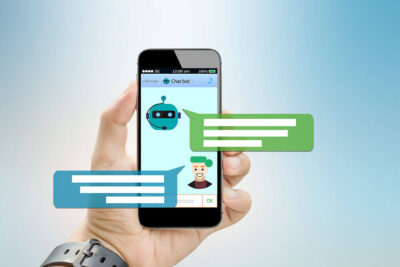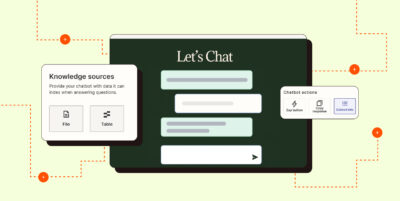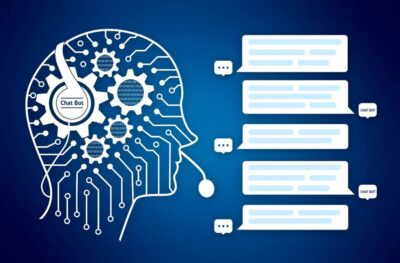Table of Contents
Convenience is taking over the healthcare space. Chatbots in healthcare are a key part of the convenience that has come with the digital revolution and are transforming the healthcare industry by providing a range of benefits to patients, healthcare providers, and insurers. With the rapid advancements in technology, chatbots are becoming more sophisticated and are being used in various healthcare settings, from hospitals to clinics and private practices. These intelligent systems can improve patient care, reduce healthcare costs, and streamline administrative tasks, among other benefits.

One of the main benefits of chatbots in healthcare is their ability to improve patient experience. By providing personalized support and assistance, chatbots can help patients navigate the healthcare system, answer their questions, and provide them with relevant information about their health condition. This can lead to better patient engagement and satisfaction, which can ultimately improve health outcomes.
1. Improving Patient Engagement
One of the most significant benefits of chatbots in healthcare is improving patient engagement. Chatbots can help patients feel more connected to their healthcare providers, leading to better health outcomes. Here are some ways that chatbots can improve patient engagement:
24/7 Availability
Chatbots are available 24/7, providing patients with immediate access to information and support. Patients can ask questions about their health, schedule appointments, and receive reminders about medication and treatment plans. This 24/7 availability can be especially beneficial for patients with chronic conditions who require ongoing support.
Personalized Interactions
Chatbots can provide personalized interactions with patients, tailoring their responses to the patient’s specific needs and preferences. By collecting data about the patient’s health history and preferences, chatbots can provide more personalized recommendations and support. This personalized approach can help patients feel more engaged in their healthcare and more motivated to follow through with treatment plans.
Patient Empowerment
Chatbots can empower patients to take control of their health by providing them with the information and resources they need to make informed decisions. By educating patients about their health conditions and treatment options, chatbots can help patients feel more confident in managing their health. This sense of empowerment can lead to better health outcomes and a more positive patient experience.
2. Enhancing Healthcare Efficiency

Chatbots are transforming the healthcare industry by streamlining administrative tasks, reducing workload, and delivering faster services. In this section, we will explore how chatbots enhance healthcare efficiency.
Streamlining Administrative Tasks
Chatbots in healthcare can be programmed to handle routine administrative tasks such as appointment scheduling, prescription refills, and test results. This automation reduces the workload of healthcare professionals and enables them to focus on more complex tasks. Patients can also benefit from the convenience of being able to schedule appointments and receive test results without having to wait on hold or visit the clinic.
Reducing Workload
Another use of chatbots in healthcare is to handle a large volume of patient inquiries, reducing the workload of healthcare professionals. This increased efficiency can result in better patient outcomes and a higher quality of care. Chatbots can also help to alleviate the shortage of healthcare professionals, particularly in rural areas where access to healthcare is limited.
Faster Service Delivery
The shorter the time taken to deliver healthcare services, the smaller the costs involved. The use of chatbots in healthcare delivery helps provide immediate responses to patient inquiries, reducing wait times and improving service delivery. Patients can receive real-time information about their health, medications, and treatment plans. This can help to improve patient satisfaction and reduce the risk of medical errors.
3. Cost Reduction Strategies
Chatbots in healthcare can help reduce costs in various ways. Here are some cost reduction strategies that healthcare organizations can implement with chatbots:

Automating Routine Inquiries
Chatbots can help automate routine inquiries, such as appointment scheduling, prescription refills, and lab results. By automating these inquiries, healthcare staff can focus on more complex tasks, such as patient care. This not only improves the efficiency of healthcare delivery but also reduces labor expenses.
Lowering Operational Expenses
Deploying chatbots in healthcare is a cost-effective strategy that significantly reduces operational expenses. For instance, chatbots can help reduce the number of missed appointments by sending appointment reminders to patients. This not only improves patient engagement but also reduces the overhead costs associated with missed appointments.
Moreover, chatbots can help reduce the costs of healthcare app development. According to a study cited by Moon Technolabs, deploying chatbots in healthcare can lead to savings of up to 30% in app development costs. This makes advanced care accessible to a wider audience, contributing to sustainable healthcare.
By implementing chatbots in healthcare, providers can improve the efficiency of healthcare delivery, reduce labor expenses, and make advanced care accessible to a wider audience. This is particularly important because, with an aging population, the disease burden is increasing; hence, more cost-effective healthcare delivery is fundamental. There is also pressure on providers to minimize costs and the use of chatbots in healthcare offers one of the most effective approaches to achieve this outcome.
4. Data Management and Analysis
Chatbots in healthcare play a transformative role by enhancing data collection and promoting patient engagement. They can interact with patients in an intuitive and accessible manner, gathering valuable health data in real time as they are equipped with advanced natural language processing capabilities. Below are two key areas where chatbots excel in data management and analysis.
Real-Time Data Collection

Chatbots in healthcare can collect patient data in real time, which is crucial for providers to monitor and manage their patients’ health. By asking patients questions and collecting their responses, chatbots can gather valuable information such as symptoms, medication usage, and other relevant data points. This data can be used to create a more comprehensive picture of a patient’s health, which can help healthcare providers make more informed decisions about their care.
Patient Data Analysis
Once patient data has been collected, chatbots can further analyze it to identify patterns and trends. This analysis can help healthcare providers identify potential health issues before they become serious, allowing for earlier intervention and treatment. This is essential in the practice of preventive care, which ensures quality outcomes and reduces healthcare costs. Furthermore, chatbots can use this data to personalize their interactions with patients, providing tailored advice and recommendations based on their unique health needs.
Overall, chatbots are a valuable tool for data management and analysis in healthcare. By collecting and analyzing patient data in real-time, they can help healthcare providers make more informed decisions about their patients’ care.
5. Improving Patient Outcomes
Chatbots have the potential to improve patient outcomes by supporting chronic disease management and enhancing treatment adherence.

Supporting Chronic Disease Management
Chatbots in healthcare can support patients in managing chronic conditions by providing personalized care, reminders, and educational resources. For example, a chatbot can monitor a patient’s blood sugar levels and provide recommendations for managing diabetes. It can also offer tips on lifestyle changes, such as exercise and diet, to help improve overall health. Providing continuous support using chatbots in healthcare can help your patients manage their conditions more effectively and prevent complications.
Enhancing Treatment Adherence
Chatbots can also help improve treatment adherence by providing medication reminders, tracking symptoms, and answering questions about treatment. For example, a chatbot can remind a patient to take their medication at the right time and provide information about potential side effects. It can also track symptoms and alert the patient’s healthcare provider if there are any concerns.
When you improve treatment adherence using chatbots in healthcare, you can help patients achieve better health outcomes and reduce the risk of complications. There is also an impact on the cost factor both for you as a provider and your patient due to reduced hospital visits.
6. Supporting Healthcare Staff
The use of chatbots in healthcare is not only beneficial for patients but also for healthcare staff. They can assist with patient triage and provide clinical decision support, which can help healthcare staff to focus on more complex tasks. Here are some ways in which chatbots can support healthcare staff:

Assisting with Patient Triage
Chatbots in healthcare can be used as a first point of contact for patients, helping to triage patients so that healthcare staff can focus on those who need more urgent attention. Chatbots can ask patients questions about their symptoms and provide advice on what to do next. This can help to reduce the workload for healthcare staff, allowing them to focus on patients who need more urgent attention.
Providing Clinical Decision Support
Chatbots in healthcare can also be used for clinical decision support to healthcare staff. They can help to identify potential diagnoses and suggest appropriate treatments based on the patient’s symptoms. This can help healthcare staff to make more informed decisions, reducing the risk of misdiagnosis and improving patient outcomes.
Overall, chatbots in healthcare are a valuable tool for supporting healthcare staff. They can help to reduce the workload for healthcare staff and provide clinical decision support, allowing them to focus on more complex tasks.
Future of Chatbots in Healthcare
Chatbots are poised to revolutionize healthcare by providing 24/7 support and delivering tremendous cost savings. According to Topflight, AI chatbots are estimated to have saved around $3.6 billion globally by 2022.

The role of chatbots is becoming increasingly pivotal in healthcare. These digital assistants are not just augmenting the healthcare experience; they are redefining patient engagement. Chatbots provide personalized care by offering relevant information, guidance, and advice based on user prompts and data shared by them about their health.
The future of chatbots in healthcare is bright. As healthcare systems grapple with staffing shortages, chatbots can help fill the gap by providing support to patients. They can provide triage services, monitor patients’ health, and offer medication reminders.
In addition, chatbots can help improve patient outcomes by providing health education and promoting healthy behaviors. They can also help reduce healthcare costs by preventing unnecessary hospital readmissions and emergency room visits.
Overall, chatbots have the potential to transform the healthcare landscape by providing personalized, cost-effective, and accessible care to patients.







